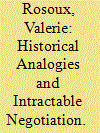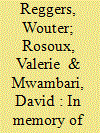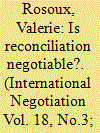|
|
|
Sort Order |
|
|
|
Items / Page
|
|
|
|
|
|
|
| Srl | Item |
| 1 |
ID:
167454


|
|
|
|
|
| Summary/Abstract |
This article questions the role of historical analogies in reaching – or not – effective and durable agreements. It compares two emblematic cases, the Israeli-Palestinian case and the Franco-Algerian case, and focuses on the tension that exists between the weight of the past and the need to move forward. The purpose of the article is not to reduce the hardest cases to their historical dimension. It is rather to show that the ways in which the memories of past events are interpreted, misinterpreted, or even manipulated create the context that shapes peace processes. The analysis is structured on the three main functions attributed to historical analogies: representing the unfamiliar, assigning social roles, and framing action. The examination of these functions helps us to better understand how negotiators and mediators can try to live with the memories rather than without them or against them.
|
|
|
|
|
|
|
|
|
|
|
|
|
|
|
|
| 2 |
ID:
186080


|
|
|
|
|
| Summary/Abstract |
This article explores the interactions between the memories of Belgian peacekeepers killed in the 1994 genocide in Rwanda, the weight of the colonial past, and the Belgian foreign policy. Using interviews with Belgian politicians and diplomats, families of peacekeepers, former blue helmets, as well as a corpus of official speeches, this article finds that the memorialization of blue helmets has influenced Belgian political choices on three levels, namely: domestic politics, its bilateral relationship with Rwanda, and more broadly its position in international peacekeeping. In doing so, this article contributes to interdisciplinary debates on the role of collective memory in domestic and international politics.
|
|
|
|
|
|
|
|
|
|
|
|
|
|
|
|
| 3 |
ID:
123696


|
|
|
|
|
| Publication |
2013.
|
| Summary/Abstract |
AbstractThe purpose of this article is to question some basic assumptions regarding reconciliation after wars and mass atrocities. Indeed, how can numerous policy-makers, practitioners, and scholars contend that reconciliation is necessary while it is often distrusted and rejected by victims? Are there not cases where calls for reconciliation would prove to be fruitless and even detrimental for peace and/or democracy? To answer these questions, it is worth looking at the interactions between reconciliation and negotiation. Beyond a theoretical interest, this question has a direct impact for practitioners; a better understanding of the issue is actually a sine qua non condition for more efficient interventions. In terms of methodology, this study refers to various examples as illustrative cases (Afghanistan, Rwanda, South-Africa, and the Franco-German case). Its objective is not to capture the complexity of each case study but to determine to what extent reconciliation can be considered as negotiable.
|
|
|
|
|
|
|
|
|
|
|
|
|
|
|
|
| 4 |
ID:
172310


|
|
|
|
|
| Summary/Abstract |
The focal point of this essay is the duration of intractable conflicts. The mere passage of time has no magical effect on conflicting notions of justice. On the contrary, a succession of crises and tensions accentuates entrenched positions concerning historical grievances. First, we present the processes through which parties defend a particular notion of justice on behalf of previous generations as rational games that depend, to a large extent, on parties’ interests. Second, we examine these processes from a moral perspective. Rather than emphasizing strategic dynamics that are based on political interpretations of the past, we focus on ethical quandaries related to the “paradoxical absence” of those who remain at the center of the justice claims. Third, we go beyond rational and moral dimensions to focus on the emotional weight of traumatic events and their long-lasting impacts on victims’ descendants.
|
|
|
|
|
|
|
|
|
|
|
|
|
|
|
|
|
|
|
|
|